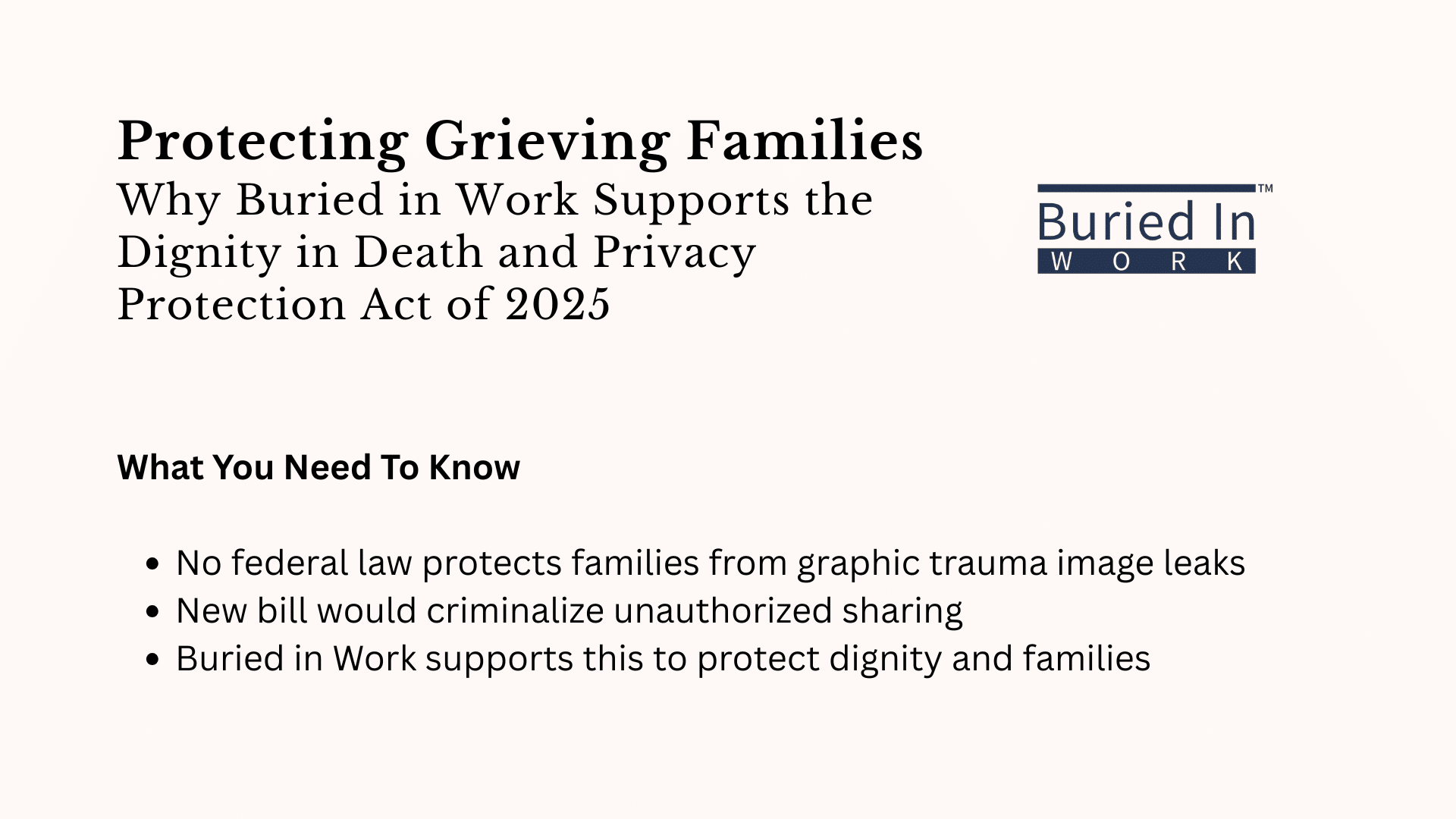At Buried in Work, our mission is to bring clarity, dignity, and support to people navigating death and everything that comes with it. Sometimes that means helping a family get organized. Sometimes it means helping them talk about legacy. And sometimes, like now, it means standing up for their right to grieve in peace.
We are proud to support the Dignity in Death and Privacy Protection Act of 2025, a proposed federal law that would make it a crime to publicly share graphic trauma scene photos or videos involving a deceased person without the consent of their next of kin. Championed by Jess Wakefield CFSP, a licensed funeral director and embalmer, and Don Gilmartin, an expert in Biohazard, Drug Lab, Hoarder & Infection Control Cleaning who you may recognize from A&E’s Hoarders.
Their front-line experience in deathcare and trauma response is exactly what makes this proposal so grounded, thoughtful, and necessary.
The Problem
Right now, there is no clear federal law preventing someone from sharing graphic images of a person who has died. These images are sometimes leaked, sold, or shared for entertainment or even used as marketing material. Families find out when it’s too late. The emotional damage is long-lasting.
Here are just a few examples:
- Kobe Bryant crash photos (California) Deputies from the LA County Sheriff’s Department shared unauthorized photos of the crash that killed Kobe Bryant, his daughter Gianna, and seven others. Vanessa Bryant sued for emotional distress and settled for $28.85 million.
- Golden State Killer victims’ family blindsided A daughter of two murder victims was told a docuseries would contain disturbing content. She was not told that real crime scene photos of her parents would be shown.
- Spaulding Devon, LLC v. Michelle Syers (Florida) Cleanup scene photos were posted on social media for business promotion, violating both ethical norms and common decency.
- Prison guards share photos of mutilated body (California) Guards took and shared cellphone images of a murdered inmate. The victim’s mother was forced to witness the photos going public.
These stories are shocking, but unfortunately not rare. Families are left to deal with the emotional fallout, with no consistent legal protection to prevent this from happening.
What the Law Would Do
The Dignity in Death and Privacy Protection Act of 2025 would:
- Make it a federal crime to share trauma scene images or videos involving the deceased without consent from next of kin
- Impose fines, jail time, and civil liability for violations
- Allow exceptions only for anonymized educational use or investigative necessity
- Give the Department of Justice the authority to investigate and enforce violations across state lines
Why Buried in Work Supports This
Families come to us looking for peace of mind. We help them get their affairs in order, share meaningful stories, and plan for what comes next. But none of that matters if a family’s privacy and their loved one’s dignity can be violated at any time, with no consequence.
This legislation creates basic, reasonable safeguards. It’s not about hiding the truth. It’s about protecting people in their most vulnerable moments from exploitation and trauma that should never happen in the first place.
We support this proposal fully, and we hope you’ll join us. Whether you’re a policymaker, care provider, nonprofit, or someone who’s been affected by loss, your voice matters here.
How You Can Help
- Read the draft legislation: View the full proposal here
- Share your support with community leaders, legislators, and organizations that care about privacy and dignity in death
- Speak out on social media or within your professional networks
- Protect families by helping raise awareness of this critical gap in federal law
For questions or to offer your input, contact the drafters directly:
- Jessica Wakefield – jawakefield930@msn.com
- Don Gilmartin – dgilmartin@steri-clean.com
Together, we can help ensure no family has to face this kind of violation again.

